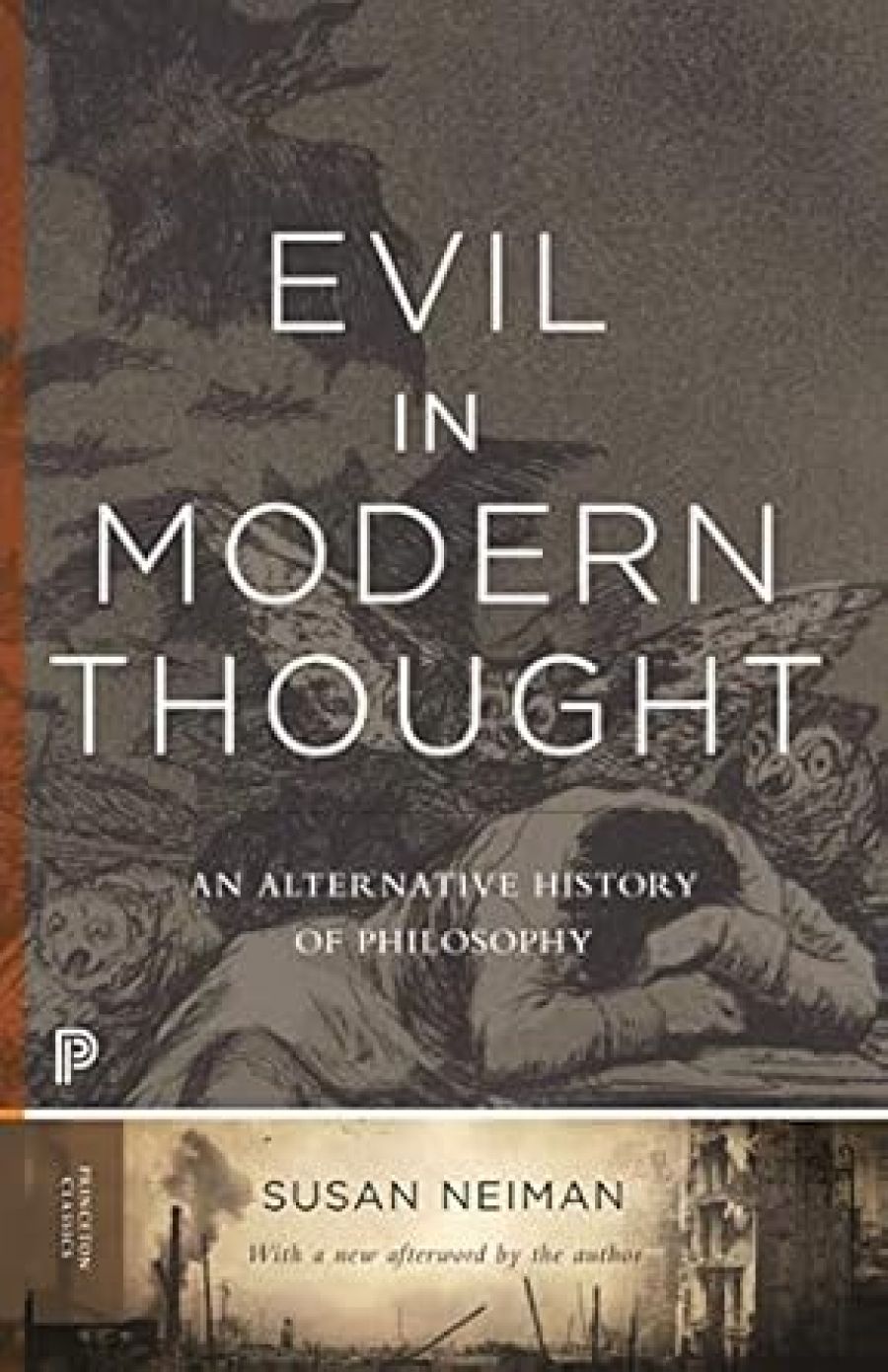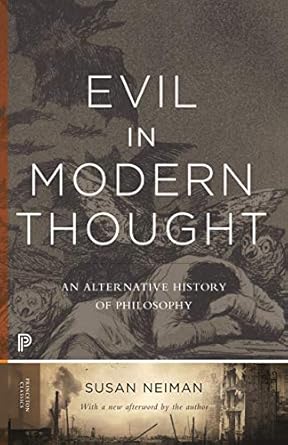
- Free Article: No
- Contents Category: Philosophy
- Review Article: Yes
- Online Only: No
- Custom Highlight Text:
Late in in the thirteenth century, Alfonso X (‘The Wise’), king of Castille, declared: ‘If I had been of God’s counsel at the Creation, many things would have been ordered better.’ He raised a storm. That wickedness, natural disaster and the inexorable corruption of things filled the world with suffering had hardly gone unnoticed, of course. Theologians had long sought to reconcile the existence of evil with God’s omnipotence and benevolence. But Alfonso reanimated a worm in the heart of reason: the suspicion that, really, God could have done better.
- Book 1 Title: Evil in Modern Thought
- Book 1 Subtitle: An alternative history of philosophy
- Book 1 Biblio: Scribe, $53pb, 370pp
- Book 1 Cover Small (400 x 600):

- Book 1 Cover (800 x 1200):

Pope thought that we would never understand God’s plan and should stick to the study of Man. (‘All this dread ORDER break – for whom? For thee?/ Vile worm! Oh madness! Pride! Impiety!’) But Leibniz thought we would: for God’s design must be in conformity with reason. That restriction was a subtle slide for God. When Rousseau presently argued that there was evil aplenty but it was all our own doing. God began to look superfluous. Kant noticed Man’s desire to become God. Marx said that theodicies had hitherto defended God; the point was to replace Him. Soon there were rumours of His death. Nietzsche knew His demise would disenchant the world; but we could not simply usurp the Creator, we had first to undergo divinisation ourselves.
A decade after Pope’s death in 1744, earthquake and fire devastated Lisbon, with huge loss of life. One hundred and ninety years later, the world discovered Auschwitz. Before Lisbon, natural and moral evils had been conjoined, the former understood universally as punishment for the latter. The Lisbon disaster prised them apart. The separation persisted and is, as Susan Neiman notes, one of the marks of’ the modem: natural evils, for most of us, no longer have meaning at all. Auschwitz precipitated a conceptual crisis far more significant. Neiman articulates the difference in various ways. The most succinct and resonant is this: ‘Lisbon revealed how remote the world is from the human; Auschwitz revealed the remoteness of humans from themselves.’
Evil in Modern Thought: An Alternative History of Philosophy is a big book picking up threads of some very big ideas through an impressive array of major modern thinkers. Neiman suspends the threads between the poles of Lisbon and Auschwitz and weaves a thoroughly interesting yarn. She contends that ‘in some form or another, the problem of evil is the root from which modern philosophy springs’. She aims to show that ‘as an organizing principle for understanding the history of philosophy, the problem of evil is better than alternatives’. Neiman develops an unusually embellished view of what the problem of evil involves – the very intelligibility of the world itself – but, even in that light, I think she pretty evidently falls short of her target: only the sapping love of simplicity could drive a philosopher to suppose that there was a single, or even a few, organising principles in modem philosophy.
This is no alternative history, but it is very fine history of philosophical thought about evil. It has fresh and substantial things to say about Leibniz, Pope, Rousseau, Kant, Hegel and Marx, who insisted that there was rational order behind the fell appearances; and about Bayle, Voltaire, Hume, Sade and Schopenhauer, who denied it. Nietzsche and Freud, whom Neiman recognises in many respects as her most serious antagonists, get their own section. Camus, Arendt, Adorno, Horkheimer and Rawls also receive discussion. Arendt is a major influence, and the exposition of her views is superb; the attenuated discussion of Rawls seems to be a concession to Analytic philosophy.
Hopping from peak to peak is not a bad way of doing history of philosophy: philosophers, more perhaps than most others who leave written records of their activity, diligently feed on their predecessors, longing, like cannibals, to incorporate them. Neiman says that she is not interested in the causal connections between the thinkers but in showing how certain general developments make sense. Some of the connections emerge anyway. Illuminating as intellectual history, the book is, in my appreciation, considerably weaker as philosophy. This is a distinction that Neiman may repudiate, but it is underscored, in my view, by her insouciance towards conceptual analysis and her condescension to Analytic philosophy.
Lisbon undid natural evil and left only moral evil standing and a rift between the world and reason that neither Hegel nor Nietzsche could heal. Auschwitz presented an unprecedented instance of moral evil and revealed that we lacked the conceptual resources to understand it. ‘It devastated the possibility of intellectual response.’ Primo Levi’s report of a guard’s statement. ‘Here there is no “Why?’”, reveals one dimension of the abyss. But, according to Neiman, the most devastating revelation was our inability to rely on a clear notion of the role of intention in evil. ‘At every level, the Nazis produced more evil, with less malice, than civilization had previously known ... Who was the designer? ... Auschwitz revealed the gaps between the pieces of our concepts of intention. Neither malice nor foresight was sufficient to account for all the evil they were meant to explain.’ We moderns naturally link responsibility to intention. Auschwitz demonstrated that ‘[t]he notion cannot carry the weight that contemporary forms of evil bring to bear on it’. So Arendt was driven to break with modem philosophical tradition: ‘Eichmann’s harmless intentions did not mitigate his responsibility.’ Evil is comprehensible, but only by snapping its tic to intention. Neiman appears to endorse this view and, if I read her right, retreats to something resembling the archaic Greek conception of miasma. This is not a good move, and a more careful. analytical approach may have rescued her. She bemoans the absence of a general account of intention, and there is much beating up of the dust and complaining that one cannot see. In fact there are such accounts, not least in that Analytic tradition which tries her patience.
The impatience with distinctions inflates the problem of evil to unmanageable dimensions. Levinas extended the notion of theodicy to secular forms: it becomes ‘any way of giving meaning to evil that helps us face despair. Theodicies place evils within structures that allow us to go on in the world.’ But Neiman locates an impulse to theodicy even more basic than the need to explain evil. It arises from the dissonance between what is and what ought to be that is ‘embodied in the principle of sufficient reason ... the belief that we can find a reason for everything the world presents’. This is the urge that keeps alive both the problem of evil and theodicy. ‘When the world is not as it should be, we begin to ask why ... We proceed on the assumption that the true and the good, and just possibly the beautiful, coincide. Where they do not we demand an account.’ Indeed, ‘[b]elief that there may be reason in the world is a condition of the possibility of our being able to go on in it’.
Freud is chided because he said that religion begins in the longings of the frightened child. But the ‘child seeks sense as well as protection. One demand is no less fundamental than another.’ Children not only fear, they wonder why the world is as it is. ‘The only answer that will truly satisfy is this one: Because it’s the best one. We stop asking why when everything is as it should be.’
But halt: when everything is as it should be! By the finale, Neiman has so merged the problem of evil, the urge to religion, theodicy, the quest for transcendence and the search for reason in the world that she doesn’t notice having shot beyond the bounds of sense.
There is an index, and it is good.


Comments powered by CComment